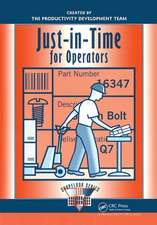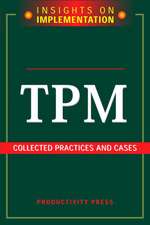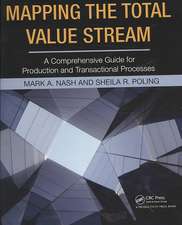Turbo Flow: Using Plan for Every Part (PFEP) to Turbo Charge Your Supply Chain
Autor Tim Conrad, Robyn Rooksen Limba Engleză Paperback – noi 2010
Tapping into two decades of combined experience at Toyota Motor Manufacturing, the authors explains how to use PFEP to determine how much you need to build, the proper frequency for deliveries, how often you need to pick up from suppliers, and how much inventory you require.
- Presents an overview of PFEP for finished goods
- Discusses internal route planning and design using PFEP data
- Details external logistics and synchronization of manufacturing, logistics, and inventory cycles
Preț: 347.19 lei
Nou
Puncte Express: 521
Preț estimativ în valută:
66.44€ • 71.04$ • 55.39£
66.44€ • 71.04$ • 55.39£
Carte tipărită la comandă
Livrare economică 17 aprilie-01 mai
Preluare comenzi: 021 569.72.76
Specificații
ISBN-13: 9781439820674
ISBN-10: 1439820678
Pagini: 144
Ilustrații: 61 black & white illustrations, 1 black & white tables
Dimensiuni: 178 x 254 x 13 mm
Greutate: 0.27 kg
Ediția:1
Editura: Taylor & Francis
Colecția Productivity Press
Locul publicării:Oxford, United Kingdom
ISBN-10: 1439820678
Pagini: 144
Ilustrații: 61 black & white illustrations, 1 black & white tables
Dimensiuni: 178 x 254 x 13 mm
Greutate: 0.27 kg
Ediția:1
Editura: Taylor & Francis
Colecția Productivity Press
Locul publicării:Oxford, United Kingdom
Public țintă
Professional Practice & DevelopmentRecenzii
This book defines the role of production control and supply chain management from both a broad view and a ‘nuts-and-bolts, how-to’ perspective. The Plan for Every Part (PFEP) process will help your organization cut across the traditional silos of distribution, manufacturing, purchasing and logistics to create a transparent process that will enable you to truly supply the right part at the right time in the quantity needed.
—Mike Hoseus, Co-Author of Toyota Culture, Former General Manager, Toyota Motor Manufacturing Kentucky
Tim and Robyn have taken the PFEP to another level. Their detailed approach of applying PFEP principles to the entire supply chain will help any company eliminate waste and make progress on their lean journey.
—Earl D. Wilson, Co-Author of Making Materials Flow, President, Wilson Lean Concepts, Inc.
Robyn and Tim so humbly point out that every part has a story, and you have to listen to that story. This is a subtle, but very important point…. Plan for Every Part (PFEP) builds the foundation for supply chain excellence and if truly embraced, will lead to a sustainable competitive advantage with your customers.
—John Bohenick, Executive, Consultant, Board Director, & Former President of the Gates Corporation
A must read for any organization creating a lean enterprise by improving speed in the supply chain.
—Tribby Warfield, Gates Corporation, President, Power Transmission Division North America
—Mike Hoseus, Co-Author of Toyota Culture, Former General Manager, Toyota Motor Manufacturing Kentucky
Tim and Robyn have taken the PFEP to another level. Their detailed approach of applying PFEP principles to the entire supply chain will help any company eliminate waste and make progress on their lean journey.
—Earl D. Wilson, Co-Author of Making Materials Flow, President, Wilson Lean Concepts, Inc.
Robyn and Tim so humbly point out that every part has a story, and you have to listen to that story. This is a subtle, but very important point…. Plan for Every Part (PFEP) builds the foundation for supply chain excellence and if truly embraced, will lead to a sustainable competitive advantage with your customers.
—John Bohenick, Executive, Consultant, Board Director, & Former President of the Gates Corporation
A must read for any organization creating a lean enterprise by improving speed in the supply chain.
—Tribby Warfield, Gates Corporation, President, Power Transmission Division North America
Cuprins
Foreword, Introduction, 1. Toyota Practiced Lean before It Was Called “Lean”, 2. Understanding Plan for Every Part, 3. Management of PFEP, 4. Managing Loops, 5. Finished Goods Planning, 6. Using PFEP for Internal Planning, 7. Delivering Parts to the Operators’ Fingertips, 8. Planning: Supporting Processes, 9. Supply Chain Complexity, 10. Concluding Comments, References, Index, Authors
Descriere
A Plan for Every Part (PFEP) is all about determining the right part at the right time, in the quantity needed. This book explains how to take this detailed inventory plan from the manufacturing arena and apply it to boost performance and cost efficiencies in your supply chain. Tapping into decades of combined experience at Toyota Motor Manufacturing, the authors explains how to use PFEP to determine how much you need to build, the proper frequency for deliveries, how often you need to pick up from suppliers, and how much inventory you require.










